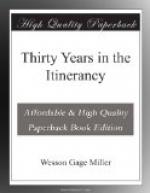God among them, and then suggested such items of business
as would require their attention. This done, I
took my seat, for what more could I do. The business
must now be done in a strange language, and in the
method of the red man. After sitting in absolute
silence for some minutes, the head Chief of the Nation,
“Big Jake,” as he is called, being one
of the Stewards, turned to a brother on his right
and spoke a few words, and received a reply. Then
turning to another, he did the same, and thus continued
to address each personally, until all had been consulted.
At intervals there were long pauses, indicative, as
I judged, of the gravity of the matter to be considered.
At the end of an hour the Council had completed its
work. The Chief then arose in a very dignified
manner, but without ostentation, and, calling to his
aid an interpreter, proceeded to reply to the opening
address. He began his speech by expressing thanks,
on behalf of himself and people, that the “Big
Missionary” had come once more to see them.
He next referred to the good work that had been performed
by the Missionary, and the special blessing of God
upon his people. And in conclusion, he reported
the items of business they had considered, and the
action taken in each case. If anything further
was desired at any time, it was always presented in
a most respectful manner. In this case it was
represented that they needed some repairs on the Church,
and a bell, and they desired that the Missionary might
be permitted to go abroad and raise the necessary
funds. Permission was granted, and the Missionary,
taking several fine singers of the Nation with him,
went to New York, Boston, and other places, and secured
the needed help.
At the close of the public services came the hand
shaking. The Missionary understood the matter
and detained me in the Altar for a moment, Commencing
with the ladies and ending with the children, every
person in the Church came forward and shook hands with
the Elder.
I was greatly pleased with “Chief Jake.”
He was a man of stalwart frame, standing with head
and shoulders above the people around him. That
giant frame supported a large head, adorned by an
expressive face. His movement was dignified simply
because he was a born nobleman, and did not know how
to appear other than like a prince. He was benevolent
and tender to all who were trying to do right, but
he was a terror to evil-doers. Standing for his
people or the rights of the oppressed, he was absolutely
invincible.
Brother Requa entered the Conference in 1847, after
having been employed one year as second preacher at
Waupun. He was appointed to Brothertown in 1847,
to Lowell in 1848, and Fond du Lac in 1849, Here his
health partially failed, and, in consequence, he was
sent to Oneida. From the first, Brother Requa
attracted attention as a Preacher. The first time
I heard him was at the Camp-Meeting at Sun Prairie,
in the summer of 1846. He had only recently been




